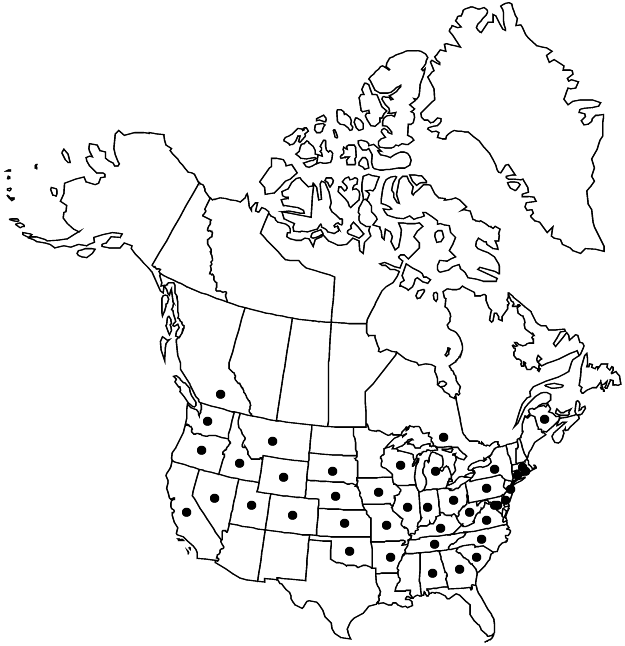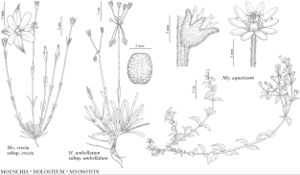familyCaryophyllaceae
subfamilyCaryophyllaceae subfam. Alsinoideae
genusHolosteum
speciesHolosteum umbellatum
subspeciesHolosteum umbellatum subsp. umbellatum
Holosteum umbellatum subsp. umbellatum
WeedyIntroducedIllustrated
Treatment appears in FNA Volume 5. Treatment on page 95.
Stems (1–)4–35 cm, glabrous to or often glandular-pubescent, especially proximally, often glaucous. Leaves: basal blades oblanceolate, 5–25 mm; cauline leaves in 1–4 pairs, blade 2–30 mm, margins ciliate. Flowers: sepals 2.5–4.5 mm; petals 3–5 mm. Capsules 4–8 mm. 2n = 20, 40 (both Europe).
Phenology: Flowering late winter–early spring.
Habitat: Lawns, roadsides, waste places
Elevation: 50-1700 m
Distribution

Introduced; B.C., N.B., Ont., Ala., Ark., Calif., Colo., Conn., Del., D.C., Ga., Idaho, Ill., Ind., Iowa, Kans., Ky., Md., Mass., Mich., Mo., Mont., Nebr., Nev., N.J., N.Y., N.C., Ohio, Okla., Oreg., Pa., R.I., S.C., S.Dak., Tenn., Utah, Va., Wash., W.Va., Wis., Wyo., Europe (e Mediterranean region), c, sw Asia, Africa (Mediterranean region), introduced in South America (Argentina), w Europe, Africa (Republic of South Africa).
Discussion
Selected References
None.
Lower Taxa
None.
... more about "Holosteum umbellatum subsp. umbellatum"
B.C. +, N.B. +, Ont. +, Ala. +, Ark. +, Calif. +, Colo. +, Conn. +, Del. +, D.C. +, Ga. +, Idaho +, Ill. +, Ind. +, Iowa +, Kans. +, Ky. +, Md. +, Mass. +, Mich. +, Mo. +, Mont. +, Nebr. +, Nev. +, N.J. +, N.Y. +, N.C. +, Ohio +, Okla. +, Oreg. +, Pa. +, R.I. +, S.C. +, S.Dak. +, Tenn. +, Utah +, Va. +, Wash. +, W.Va. +, Wis. +, Wyo. +, Europe (e Mediterranean region) +, c +, sw Asia +, Africa (Mediterranean region) +, introduced in South America (Argentina) +, w Europe + and Africa (Republic of South Africa). +
Present +
true +
Sp. Pl. +
1753 +
Holosteum umbellatum subsp. umbellatum +
Holosteum umbellatum +
subspecies +
